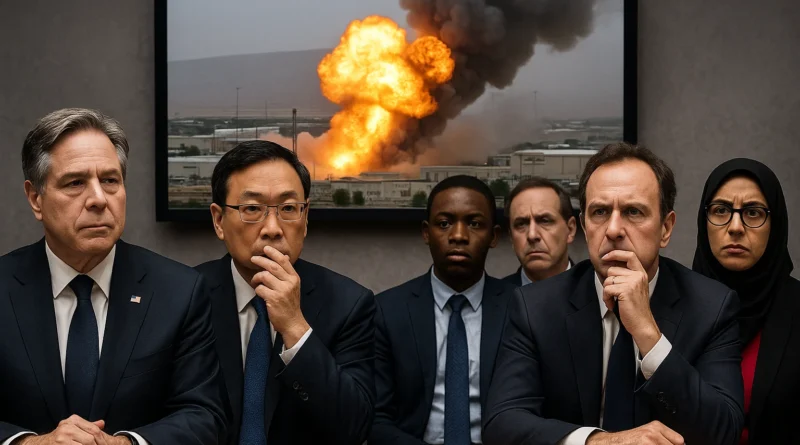Global Divide: Nations React to US Strikes on Iran’s Nuclear Facilities
The United States’ direct military intervention in the escalating conflict between Israel and Iran, marked by strikes on three key Iranian nuclear facilities on Sunday, June 22, 2025, has triggered a diverse and urgent array of reactions from around the world. While some allies have voiced support, many nations and international bodies have expressed grave alarm, urging de-escalation and a return to diplomatic solutions amidst fears of a wider regional conflagration.
Support and Praise from Key Allies
- Israel: Prime Minister Benjamin Netanyahu was quick to commend President Donald Trump’s decision, praising it as “bold” and “historic.” Netanyahu stated that the strikes, executed with the “awesome and righteous might of the United States,” would “change history” by denying Iran the ability to develop nuclear weapons. This reaction underscores the close coordination and shared objectives between Washington and Tel Aviv regarding Iran’s nuclear program.
Calls for Restraint and Diplomacy
A significant portion of the international community has reacted with deep concern and appeals for immediate de-escalation:
- United Nations: Secretary-General Antonio Guterres voiced “grave alarm” over the U.S. use of force, labeling it a “dangerous escalation” and a “direct threat to international peace and security.” He warned of the “growing risk” of the conflict spiraling “rapidly out of control,” with catastrophic consequences for civilians and the region. Guterres emphasized, “There is no military solution. The only path forward is diplomacy. The only hope is peace,” urging all member states to de-escalate. The International Atomic Energy Agency (IAEA) is monitoring the situation and confirmed no immediate increase in off-site radiation levels but called an emergency board meeting.
- China: State media in China, particularly through CGTN, condemned the U.S. airstrikes, cautioning that Washington might be “repeating its Iraq mistake in Iran.” Chinese commentaries described the strikes as a “dangerous turning point,” highlighting how military interventions in the Middle East often lead to “unintended consequences” and “regional destabilization.” China emphasized the need for a measured, diplomatic approach prioritizing dialogue.
- European Union (EU): EU foreign policy chief Kaja Kallas urged “all sides to step back, return to the negotiating table and prevent further escalation.” She reiterated the EU’s firm stance that “Iran must not be allowed to develop a nuclear weapon,” and announced that EU Foreign Ministers would convene to discuss the situation. Italian Foreign Minister Antonio Tajani echoed these concerns, hoping for de-escalation and a return to negotiations.
- Russia: While not immediately issuing a formal condemnation, Russia had previously warned against military intervention in the Israel-Iran conflict. Russian President Vladimir Putin and Chinese counterpart Xi Jinping recently called for de-escalation in the broader Israel-Iran conflict, condemning actions that violate the UN Charter and stressing that there is “no military solution” to issues related to Iran’s nuclear program.
- Arab States (Regional): Regional players like Oman, a traditional mediator, “denounced” the U.S. strikes as an “unlawful act of aggression” and urged “immediate and comprehensive de-escalation.” Qatar warned of “catastrophic repercussions,” while Iraq expressed deep concern and condemned the targeting of nuclear facilities, viewing it as a serious threat to regional peace. Saudi Arabia stated it is monitoring events with “great concern,” urging self-restraint and de-escalation.
- United Kingdom: Prime Minister Keir Starmer called on Iran to return to negotiations, reiterating that Iran must not be allowed to develop a nuclear weapon and that the U.S. had acted to alleviate that threat.
- New Zealand: Foreign Minister Winston Peters urged “all parties to return to talks,” stating that “diplomacy will deliver a more enduring resolution than further military action.”
- Cuba and Venezuela: These nations issued strong condemnations, with Cuba’s President Miguel Díaz-Canel calling the U.S. bombing a “dangerous escalation” and a “grave violation of the UN Charter.”
- Hamas: The Palestinian armed group strongly condemned what it called “blatant U.S. aggression against the territory and sovereignty of Iran,” viewing it as a dangerous escalation and a violation of international law.
- Australia: The Australian government, while noting the U.S. President’s statement that “now is the time for peace,” called for de-escalation, dialogue, and diplomacy in a “highly volatile” region.
The global reaction underscores a widespread fear that the U.S. strikes may have opened a new, unpredictable chapter in the Middle East conflict, with calls for diplomatic solutions now more urgent than ever.

